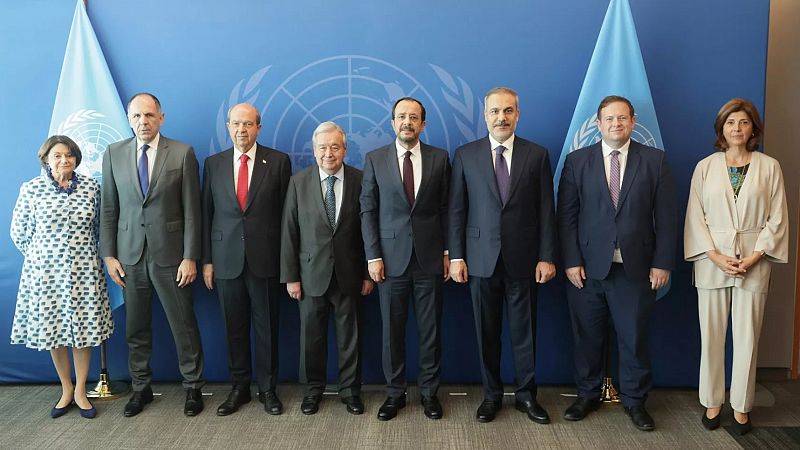
Negotiations involving five parties regarding the Cyprus issue ended on Thursday without settling major disagreements. Nevertheless, the involved parties have decided to keep talking with the support of the United Nations.
The unofficial discussions among Greek Cypriot President Nicos Christodoulides, Turkish Cypriot leader Ersin Tatar, and delegates from Greece, Turkey, and the United Kingdom did not result in an agreement to resume access between the island's two regions.
The UN Secretary-General, Antonio Guterres, has arranged further meetings for September.
"Small but meaningful advancements are being made, bit by bit, in the direction of the main objective, which is the restart of negotiations and the settlement of the Cyprus issue," Christodoulides stated following the meeting.
Guterres confirmed that four out of the six measures approved in Geneva in March — including the creation of a technical committee focused on youth matters, environmental and climate change projects, cemetery restoration, and a mine-clearing agreement that is still awaiting final technical details — have been put into action.
Key locations continue to pose challenges
Two issues are still pending: opening the initial four transit points and implementing solar energy in the buffer area. The border crossings continued to be the central matter, with Guterres undertaking what officials characterized as substantial attempts to achieve a deal.
"There are significant differences on both sides concerning the resolution of the Cyprus issue, but I believe we are gradually establishing trust and laying the groundwork for tangible actions that will benefit the Cypriot people," Guterres stated.
Greek Cypriots agreed to Turkish Cypriot suggestions to reopen checkpoints at Mia Milia and Louroutzina, yet received no reply about other suggested paths, Christodoulides mentioned. Talks about establishing a checkpoint between Athienou and Aglandjia came to a halt when Turkish delegates indicated they needed to seek input from Turkish military authorities.
The discussions led to the introduction of three new initiatives: creating a consultation group for civil society involvement, sharing cultural items, and observing air quality while tackling microplastic contamination.
Greek Foreign Minister George Gerapetritis described the conversation as "highly productive," although talks had remained inactive for eight years following the unsuccessful Crans-Montana meetings.
"It is crucial that the Cyprus issue is currently a priority on the UN Secretary General's agenda, who has designated a special envoy," Gerapetritis stated.
A three-way meeting involving Christodoulides, Tatar, and Guterres is set to occur in September during the UN General Assembly. A separate five-nation meeting is expected to happen following the elections in the Turkish-administered part of northern Cyprus in 2025.
The personal envoy of the United Nations secretary-general, Maria Angela Holguin, will remain involved in addressing the issue of border crossings between meetings.
Christodoulides also had a private meeting with Turkish Foreign Minister Hakan Fidan that lasted almost an hour following the dinner on Wednesday.
"Today, we did not listen to anything new from Turkey's familiar public declarations," Christodoulides remarked regarding the larger discussions.
Cyprus has been split since 1974, after Turkey took control of the northern part of the island following a failed coup. The Republic of Cyprus, which covers the southern two-thirds of the land, is widely recognized and a member of the European Union, whereas the separate region in northern Cyprus is only acknowledged by Turkey.
The United Nations has kept a peacekeeping mission in Cyprus since 1964.

Posting Komentar